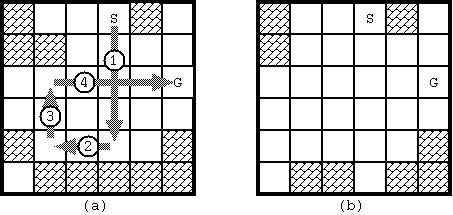标签:pspan idtransmarkspa dfspan idtransmarksp
| Time Limit: 1000MS | Memory Limit: 65536K | |
| Total Submissions: 14567 | Accepted: 6082 |
Description
On Planet MM-21, after their Olympic games this year, curling is getting popular. But the rules are somewhat different from ours. The game is played on an ice game board on which a square mesh is marked. They use only a single stone. The purpose of the game is to lead the stone from the start to the goal with the minimum number of moves.
Fig. 1 shows an example of a game board. Some squares may be occupied with blocks. There are two special squares namely the start and the goal, which are not occupied with blocks. (These two squares are distinct.) Once the stone begins to move, it will proceed until it hits a block. In order to bring the stone to the goal, you may have to stop the stone by hitting it against a block, and throw again.

Fig. 1: Example of board (S: start, G: goal)
The movement of the stone obeys the following rules:

Fig. 2: Stone movements
Under the rules, we would like to know whether the stone at the start can reach the goal and, if yes, the minimum number of moves required.
With the initial configuration shown in Fig. 1, 4 moves are required to bring the stone from the start to the goal. The route is shown in Fig. 3(a). Notice when the stone reaches the goal, the board configuration has changed as in Fig. 3(b).

Fig. 3: The solution for Fig. D-1 and the final board configuration
Input
The input is a sequence of datasets. The end of the input is indicated by a line containing two zeros separated by a space. The number of datasets never exceeds 100.
Each dataset is formatted as follows.
the width(=w) and the height(=h) of the board
First row of the board
...
h-th row of the board
The width and the height of the board satisfy: 2 <= w <= 20, 1 <= h <= 20.
Each line consists of w decimal numbers delimited by a space. The number describes the status of the corresponding square.
0 vacant square 1 block 2 start position 3 goal position
The dataset for Fig. D-1 is as follows:
6 6
1 0 0 2 1 0
1 1 0 0 0 0
0 0 0 0 0 3
0 0 0 0 0 0
1 0 0 0 0 1
0 1 1 1 1 1
Output
For each dataset, print a line having a decimal integer indicating the minimum number of moves along a route from the start to the goal. If there are no such routes, print -1 instead. Each line should not have any character other than this number.
Sample Input
2 1 3 2 6 6 1 0 0 2 1 0 1 1 0 0 0 0 0 0 0 0 0 3 0 0 0 0 0 0 1 0 0 0 0 1 0 1 1 1 1 1 6 1 1 1 2 1 1 3 6 1 1 0 2 1 1 3 12 1 2 0 1 1 1 1 1 1 1 1 1 3 13 1 2 0 1 1 1 1 1 1 1 1 1 1 3 0 0
Sample Output
1 4 -1 4 10 -1
Source
Japan 2006 Domestic就是要求把一个冰壶从起点“2”用最少的步数移动到终点“3”
其中0为移动区域,1为石头区域,冰壶一旦向着某个方向运动就不会停止,也不会改变方向(想想冰壶在冰上滑动),除非冰壶撞到石头1 或者 到达终点 3(1)所谓的“走一步”,就是指冰壶从一个静止状态到下一个静止状态,就是说冰壶在运动时经过的“格数”不视作“步数”,也就是说冰壶每次移动的距离都是不定的。
(2)还有就是由于石头会因为冰壶的碰撞而消失,因此冰壶每“走一步”,场地的环境就会改变一次。 (需要回溯)
(3)基于(2),可以发现本题虽然是要找 “最短路”,但是BFS几乎不可能,因为每“走一步”,场地的状态就要改变一次;而如果该步不满足要求,又要求把场地的状态还原到前一步,这只有DFS能做到。
(4)基于(3),DFS不是BFS,不能简单地用它来找最短路,必须要把所有可能的路一一找出来,再逐一比较它们的步数才能确定最短#include<iostream>
#include<cstdlib>
#include<cstdio>
#include<cstring>
#include<algorithm>
#include<cmath>
#include<queue>
#define INF 0x3f3f3f3f
using namespace std;
int n,m,lx,ly;
int num=0x3f3f3f3f;
int dx[]= {1,0,-1,0};
int dy[]= {0,1,0,-1};
int a[30][30];
int vis[30][30];
int Judge(int x,int y)
{
if(x<=n&&x>0&&y<=m&&y>0)
return 1;
return 0;
}
int DFS(int x,int y,int ans)
{
if(!Judge(x,y)||(ans>10))
return 0;
if(a[x][y]==3)
{
if(ans<num)
num=ans;
return 0;
}
for(int i=0; i<4; i++) //四个方向
{
for(int j=1; j<=20; j++) //一直沿着一个方向走
{
int fx=j*dx[i]+x;
int fy=j*dy[i]+y;
if(!Judge(fx,fy))
break;
if(a[fx][fy]==3) //遇到终点
{
if(ans+1<num)
num=ans+1;
return 0;
}
if(a[fx][fy]==1) //遇到障碍
{
int ffx=fx,ffy=fy;
fx=(j-1)*dx[i]+x;
fy=(j-1)*dy[i]+y;
if(fx!=x||fy!=y) //不是起点
{
a[ffx][ffy]=0;
DFS(fx,fy,ans+1);
a[ffx][ffy]=1; //回溯
}
break;
}
}
}
}
int main()
{
while(~scanf("%d%d",&m,&n))
{
num=INF;
if(!n&&!m) break;
for(int i=1; i<=n; i++)
for(int j=1; j<=m; j++)
{
scanf("%d",&a[i][j]);
if(a[i][j]==2)
{
lx=i;
ly=j;
}
}
DFS(lx,ly,0);
if(num<=10)
printf("%d\n",num);
else
printf("-1\n");
}
}
版权声明:本文为博主原创文章,未经博主允许不得转载。
标签:pspan idtransmarkspa dfspan idtransmarksp
原文地址:http://blog.csdn.net/became_a_wolf/article/details/48028381